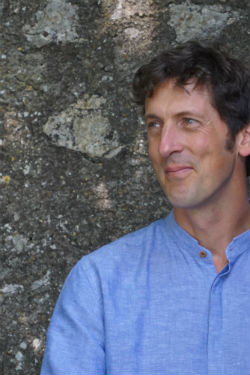NBG interviews the translator Simon Pare
How did you get into translation and how has your career unfolded?
I studied French and German, spending my third year working on an organic farm near Osnabrück. After returning to finish my degree, I did various bits of work experience on farms and in the Alps in Switzerland, followed by an MSc in Sustainable Agriculture in the UK, which led to a job in Fairtrade after I moved to Paris in 1997 with my wife. Eight years later, I’d had enough of Fairtrade and as I cast around for a second career, I remembered that I’d enjoyed translating at university. Through my network, I started doing film translations and on the side read German literature for the French publisher Albin-Michel, which led to contacts with German and British publishers.
What have been your most enjoyable translation projects?
Der fliegende Berg by Christoph Ransmayr: a free-verse masterpiece about two Irish brothers who set out to Tibet to scale a mountain higher than Everest. Albin-Michel publish Ransmayr in French, as I found out after complaining that they never seemed to react to my enthusiastic reader’s reports. S. Fischer were looking for someone to translate a sample (John E. Woods, Ransmayr’s traditional translator, was not able to do this book) and we then pitched the book to just about every English-language publisher under the sun until Seagull Books in Kolkata bought the rights. I also got to translate Ransmayr’s most recent book, Atlas eines ängstlichen Mannes, for them.
How do you pick translation projects?
I’m not yet in a position to choose my literary projects, but that ensures variety, from mass market novels to ‘high-brow’ lit to non-fiction, such as a book for Haus Publishing about Operation Epsilon, the failed Nazi atomic bomb project.
You’ve recently co-translated a book about the Panama Papers. The whole scandal unfolded very quickly – meaning the book needed to be written quickly. Did you then feel a special kind of pressure when translating it?
There was a week from first contact to contract, a month to hand in the translation and a few days to review the edited version. I felt comfortable with the topic as I had worked on Offshore Leaks for Le Monde and Swiss newspapers.
How did the collaborative translation work for this book?
Oneworld coordinated the work brilliantly, and divided up the manuscript into four equal parts for me, Seiriol Dafydd, Alice Paul and Jackie Smith. Jackie did the glossary first so that we were all using the same terminology, and Alyson at Oneworld made sure that we were all copied into answers to style and content queries. The main complication was finding the original English from the whistle-blower’s emails, which the Gebrüder Obermayr/ier (the book’s authors) had translated into German.
Do you have a favourite translated work by somebody else?
I enjoyed Sworn Virgin by Elvira Dones (And Other Stories, tr. Clarissa Botsford) about women who live as men in Albanian society. I also really liked Jacek Hugo-Bader’s Kolyma Diaries (Portobello, tr. Antonia Lloyd-Jones) about a journey through the gulag-haunted hinterlands of eastern Siberia. Both brilliant, both revealing of places I would not otherwise have discovered.
What advice or tips would you give to new translators?
The most important thing for me was alliances with French and German publishers, as well as finding in Ransmayr a writer whose work I cared deeply about. Readers’ reports were also crucial as a path into the UK publishing world. Also, don’t be shy telling anyone and everyone about your interests. I suppose the conclusion I have come to is that perseverance breeds luck!


